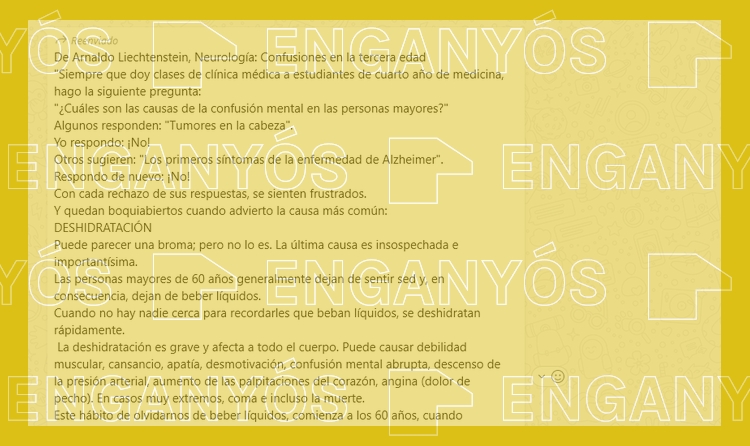It is misleading to say that the most common cause of delirium is dehydration

We debunk a message attributed to Arnaldo Lichtenstein, a Brazilian internist

What has been said?
Dehydration is the most common cause of mental confusion in older people.
What do we know?
Dehydration is one of the main medical causes that can lead to delirium in older people, but there is no evidence that it is the most common one.
You’ve asked us via our WhatsApp channel about the authenticity of a viral claim attributed to Arnaldo Lichtenstein, a Brazilian internist, in which he says that dehydration is “the most common cause” of mental confusion – i.e. delirium – in older people.
This claim is MISLEADING. Dehydration is one of the main medical causes that can lead to delirium in older people, but there is no evidence that it is “the most common cause”, as the viral text asserts, distorting the original claim which has been circulating on the internet for about 15 years.
The most common cause of delirium in older people is dehydration
In an email to Verificat, Arnaldo Lichtenstein, the author of the original claim, acknowledged that the text “is taken from an interview” that a journalist did with him “16 years ago”. That said, the text has undergone various changes versus the content originally published in 2010 in the book Saúde — A hora é Agora (EN: “Health – The time is now”), making the claim ambiguous. In the original content, for example, Lichtenstein included three “main” causes for delirium in older people, but none of them were dehydration.
Delirium has multiple causes
There are many different causes for delirium, a common syndrome among older people, especially those who are hospitalised. Even though dehydration is one of the main causes, there is no evidence that it is the most common. Other factors, such as infections, medications, low blood sugar in diabetes patients, dementia or blows to the head are typical triggers.
In the book Health – The time is now, Lichtenstein stated that “the main triggers of [delirium] are untreated diabetes, urinary tract infections and the family spending the entire day at work, shopping or in a club, away from home”. These assertions, he wrote in his email to Verificat, “are still true” today. The doctor was connecting the last point to dehydration, because elderly people “are not thirsty and do not drink fluids” if they do not have someone there to remind them.
His conclusions coincide with those in the Resident Manual for Hospital Pharmacology which, in its chapter on geriatric medicine, considers that delirium is principally caused by four medical conditions: electrolytic alterations (dehydration being the most common type), infections (including of the urinary tract), metabolic disorders (such as hypo- and hyperglycemia, which occur in patients with untreated diabetes) and situations in which not there is not enough blood supply to the organs (such as shock or cardiac arrest)
As a result, dehydration is one of the main medical causes that can lead to delirium in older people, but there is no evidence that it is “the most common”, as the viral text asserts, distorting the original claim.
Less water in the body and less feeling of thirst
Older people are especially susceptible to dehydration because their body stores less water and, in addition, they feel less thirst, which puts them at risk of drinking less fluids than necessary. Children’s bodies contain more water than those of adults and the quantity naturally decreases with age.
This, in fact, is what we see in the original text attributed to Arnaldo Lichtenstein, which stated that “after age 60, our body is made up of a little more than 50% water”. Despite a lack of a consensus on the subject, other studies have reported similar numbers.
The lower body water percentage in the elderly is due to many factors. Changes in the body’s composition, reduced renal function and the use of some pharmaceuticals with diuretic and laxative properties are the main causes. It is for that reason that the nutrition authorities recommend regularly offering beverages to older people in order to minimise the risk of dehydration.
Que Espanya està en “en alerta 5” per “atemptat imminent” a ciutats com Barcelona, Madrid, Alacant i València.
URL: https://www.verificat.cat/?p=60380
Author Name: Nom
Published Date: 2023-10-19T18:50:36-01:00
Alternate Name: Fals
1